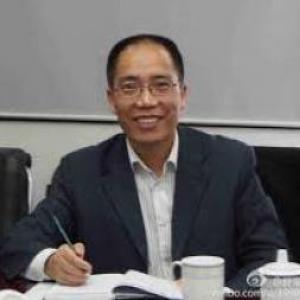At his trial at the Haidian District Court in Beijing today, veteran activist Zhao Changqing (赵常青) dismissed his two defense lawyers on the ground that serious procedural violations by the prosecution and the court had made it impossible for him to have a fair trial and for his lawyers to mount an effective defense. A little more than two hours into the trial, the court adjourned. Zhao has 15 days to assemble a new defense team.
Zhao, a vocal advocate of asset transparency active in the New Citizens Movement, was arrested in April 2013, and is being tried for “gathering a crowd to disrupt order in a public place,” which carries a maximum prison term of five years.
According to a description of today’s proceeding posted online by the lawyers, Zhang Xuezhong (张雪忠) and Lin Qilei (蔺其磊), they ended their statement to the judges and prosecutors before withdrawing from the court by saying: “Inside the court, you are trying Zhao Changqing; outside the court, the people are also trying you. We believe that ultimately history will render a fair judgment on who are in fact the righteous ones—who do not fear sacrificing themselves for the sake of the country’s progress—and who are the guilty ones, who do not hesitate to abandon the law in order to persecute the innocents.”
In their online account, Zhang and Lin also detailed what they consider to be the four key procedural problems. The following is a summary of their arguments:
1. The court deprived the lawyers of their legal right to make duplicates of the evidence, in violation of Article 38 of the Criminal Procedure Law ("A defense lawyer may, from the day when the people’s procuratorate examines a case for prosecution, consult, extract, and duplicate case materials."[1]). As a result, the defense lawyers have yet to obtain duplicates of all the evidence in this case and thus are unable to effectively defend their client.
2. The indictment indicates that the prosecutorial organs consider Zhao, along with Xu Zhiyong (许志永), Ding Jiaxi (丁家喜), Li Wei (李蔚), Yuan Dong (袁冬), Zhang Baocheng (张宝成), Hou Xin (侯欣), and others as suspects in a joint crime. Since the Beijing Municipal No. 1 Intermediate People’s Court is handling Xu Zhiyong’s case, Zhao’s case should also fall under that court’s jurisdiction, in accordance with Article 13 of the Supreme People's Court Interpretation on the Application of Criminal Procedure Law. ("In case when a person commits multiple crimes or commits a crime jointly with others or in cases that need to be tried as a single case, and if one of the suspects or one of the crimes in question falls under the jurisdiction of a higher people's court, the entire case falls under the higher court's jurisdiction."[2]) In light of this requirement, the lawyers argue that the Haidian court has no jurisdiction to try Zhao Changqing and therefore should transfer the case to the Beijing Municipal No. 1 Intermediate People’s Court.
3. The public prosecutors assigned to Zhao’s case are not qualified to handle the case. They belong to the Beijing Municipal People's Procuratorate's No. 1 Sub-Branch and were temporarily appointed by the Chief Prosecutor of the Haidian District People's Procuratorate to act as “ad hoc prosecutors” (代理检察员) in Zhao’s case. The defense lawyers argue that this surrogacy has no basis in law, and that the Law on Procuratorate does not provide for the position of “ad hoc prosecutors.”
4. The defense lawyers suspect that the court has not adhered to the principle of a public trial:the court has failed to allow the media and the public to observe the proceedings and instead arranged for its own people to occupy the observer seats, essentially conducting a secret trial in disguise.
A signatory of Charter 08, Zhao Changqing had spent six months in prison for participating in the 1989 Democracy Movement. He served two other prison terms: three years (1998-2001) for “inciting subversion of state power,” and five years (2002-2007) for “inciting subversion of state power.” He was put in solitary confinement four times while in prison, once for as long as ten months. After his release in 2007, he continued his rights defense work and engaged in citizen activism, including promoting citizens’ dinner gatherings, equal rights education, and official asset disclosure. In 2011, after the authorities cracked down on the Jasmine assemblies, he and others planned and organized “eat and drink in the same town” to exchange information and promote citizen activism.
[1] English translation of Amendments to the Criminal Procedure Law of the People’s Republic of China (Draft) and Explanatory Notes by by Johannis Bayer and Li Changshuan on behalf of the Danish Institute for Human Rights, http://lawprofessors.typepad.com/files/110830-crim-pro-law-proposed-revi...
[2] Translation of Article 13 of the Supreme People's Court Interpretation on the Application of Criminal Procedure Law by the US-Asia Law Institute at New York University School of Law in collaboration with the Danish Institute For Human Rights and with the assistance of a group of volunteers, http://usali.org/wp-content/uploads/2013/09/20130523-SPC-JI-Column-Forma...
